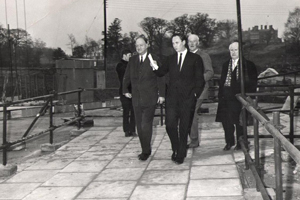
Professor Sir Albert Sloman shows Lord Butler around building works at the Colchester Campus
This week marks the 50th anniversary of the first of the BBC Reith Lecture by Essex's founding Vice-Chancellor Professor Sir Albert Sloman which set out his vision for a new kind of university.
In the lectures Sir Albert outlined how “radical innovation” was needed to break with tradition and create a university which met the needs of the modern world. This new university would be an inspirational place for students while providing the right environment for world-leading research.
Many of Sir Albert’s ideas are now taken for granted, and have helped to shape the way higher education developed, as well as shaping the University today – 50 years on, the spirit of challenging convention remains central to education and research at Essex.
Sir Albert, who died in 2012, wanted to create a university which would “provide an experience of living as well as an opportunity for learning" with high-quality research at the heart of its work. As he said in his lectures: “Teaching in a university cannot be divorced from research.”
The new university was designed to be “a community where the student is guided in the first stage of a life-long task of self-education, a community whose concern is not just with the pursuit of learning but with the fulfilment of lives.”
The series of six lectures was broadcast under the title A University in the Making from November to December 1963 and gave Sir Albert the chance to outline his vision for the new University being created at Wivenhoe Park and set to open the following year.
Professor Ted Benton on the influential BBC Reith Lectures by Professor Sir Albert Sloman from University of Essex on Vimeo.
Sir Albert was appointed as Vice-Chancellor at the age of 41 in 1962 – becoming the youngest ever in the UK at that time. He was determined from the start to create a new style of British university and this led to the invitation to give the prestigious Reith Lectures just a year after his appointment.
The recordings of five of the lectures have been lost since they were first broadcast in 1963, but the fourth lecture 'The fulfilment of lives' can still be listened to on the Reith Lectures section of the BBC Radio 4 website.
The lectures were also brought together and published as a book in April 1964 while the transcripts are still available on the BBC website.
Sir Albert wanted to break with what he regarded as the stultifying structures of the traditional universities and looked to adopt the outlook and practices of the leading American universities, such as Berkeley, which he greatly admired.
His Reith Lectures explain how he wanted to quickly build up strong, internationally recognised departments at Essex so subject coverage would be highly selective but deep. Departments would be headed by leading academics on a rotating basis so that they could maintain their research. This helped him to recruit brilliant young academics who shared his ideas to establish and lead the new departments, including the economist Richard Lipsey, the sociologist Peter Townsend, the political scientist Jean Blondel and the literary critic, Donald Davie.
Departments offered postgraduate as well as undergraduate degrees from the start, in particular taught Masters degrees, which were almost unknown at the time.
Sir Albert also wanted to break through subject boundaries so wanted undergraduates sample a broad range of courses cutting across the science/arts divide in their first year before specialising. He also wanted students in the humanities and social sciences to study other countries so each department had specialists in the United States, the Soviet Union and Latin America.
Professor Sir Ivor Crewe, Vice-Chancellor from 1995-2007, explained in his obituary for Sir Albert, how the 1963 Reith Lectures outlined a new type of university.
Sir Ivor wrote: “It would be international in its horizons, standards, faculty and students; inter-disciplinary in its curriculum; democratic in spirit; but above all committed to research and scholarship of the highest order.”
Sir Ivor Crewe said that research was seen as vital: “Every academic would be expected to prioritise research, and to shape their teaching by it and would be guaranteed research sabbaticals. They were strongly encouraged to spend them in the leading universities abroad and to attract their new colleagues back as visiting fellows.”
And Sir Albert’s innovative approach was designed to create a new culture which encouraged independent thinking and the sharing of ideas. Sir Ivor said: “Central to his idea of a university, too, was the creation of a genuine academic community, free from the hierarchy and stuffiness of the established institutions.”
Professor Anthony King, speaking at Sir Albert's memorial service in 2012, said: “Albert Sloman had a vision. He aimed to establish a university that would be international in outlook, not merely in the sense of recruiting students from other countries, but in the sense of studying other countries and having an academic staff who came from anywhere and everywhere. This was to be more than a purely English university."
Links